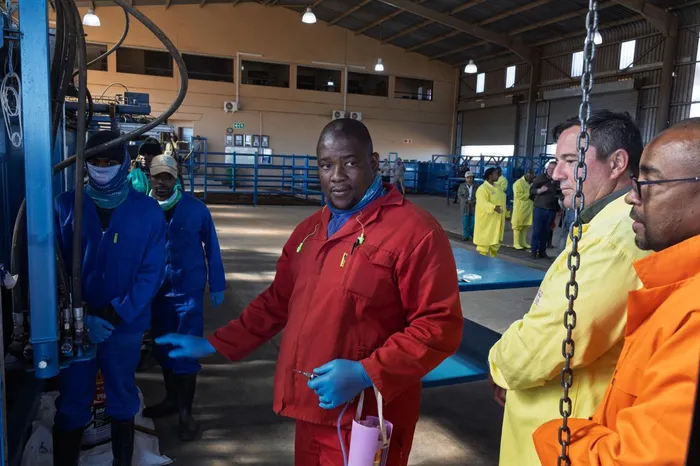Vaccination effort commences to combat Foot-and-Mouth Disease in Gauteng
AGRICULTURE

Minister of Agriculture John Steenhuisen visiting Karan Beef Feedlot in Hiedelberg, Gauteng, while Foot-and-Mouth Disease vaccination is taking place.
Image: Supplied
Minister of Agriculture John Steenhuisen has confirmed that mass vaccination efforts against Foot-and-Mouth Disease (FMD) have officially commenced in Gauteng as the agricultural sector is facing a significant challenge against the outbreak.
This announcement was made during Steenhuisen's visit to the Karan Beef Feedlot on Monday where he underscored the critical nature of the ongoing vaccination campaign following last week’s delivery of over 900 000 vaccine doses from Botswana.
This is the first time the department is vaccinating at feedlot level to get FMD under control.
Steenhuisen highlighted the severity of the FMD situation, noting outbreaks primarily in Gauteng and KwaZulu-Natal, with additional cases emerging in Mpumalanga and North West province.
“We urge farmers and workers to follow the regulations we have put in place. It's the cooperation that will help us to control the spread of FMD. We have put in regulations around auctions and the movement of animals,” he said.
“We have the Disease Management Area where animals can’t move without permits of being vaccinated and without negative test results for FMD. If there is no cooperation, we will see more outbreaks of FMD. Those who break the law must feel the consequences because there are grave economic consequences if the law is broken in this regard.”
The beef industry is exceptionally important to consumers and the economy as the impact of the FMD saw food inflation rising from 3.3% in April to 4.4% in May.
Karan Feedlot is responsible for around 30% of the sector and has caused price shocks when the operations have been stalled.
Steenhuisen said the department's goal is to get international trade back up, which has paused due to FMD.
“We have put aside R43 million for the purchase of vaccination. We haven’t spent all of it, but the first batch of 900 000 vaccines has arrived and we also plan to purchase more vaccines,” he said.
The Agricultural Business Chamber of South Africa (Agbiz) supports these vaccination efforts but expresses concern regarding the economic repercussions of ongoing FMD outbreaks.
Agbiz chief economist Wandile Sihlobo noted that farmers had expected a recovery in the red meat industry, buoyed by good grazing conditions and lower feed prices, but these expectations face new challenges as FMD outbreaks lead to temporary export market closures.
Sihlobo pointed out that while cumulative beef exports increased by 30% in 2024, reaching 38 657 tons, the recent resurgence of FMD threatens to undermine this progress.
“The recent outbreak of FMD on a few farms in various regions of South Africa presented additional challenges, leading to temporary closures of export markets again in an industry that was still on its recovery path. The financial pressures on farmers are immense, and we will have clarity about the scale in the coming months. We can expect the vaccination process to gain momentum in the last week of June 2025,” he said.
“However, the key to the long-term success of the industry lies in improving animal health, developing vaccines domestically, and implementing better surveillance, among other interventions. Efforts on this vital issue should continue through the collaboration of various stakeholders, including the government, the private sector, and organised agriculture, among others.”
Red Meat Industry Services also said that following the activation of its Operational Centre and the rollout of Phase 1 of its coordinated response to the escalating outbreak, an FMD Working Group had been appointed.
“The FMD Working Group has been formally appointed and includes leading experts in veterinary science, diagnostics, disease control, and industry representatives. The group is mandated to guide a structured, time-bound response focused on vaccination, disease containment, and the development of sustainable biosecurity systems,” it said.
BUSINESS REPORT